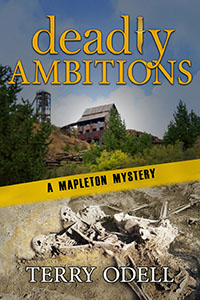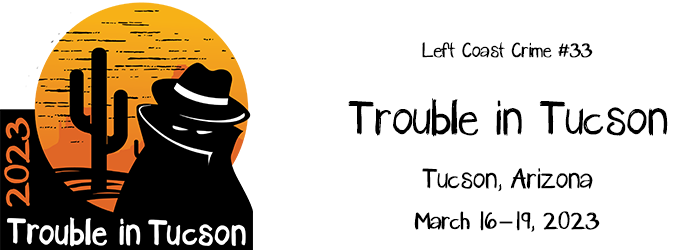San Francisco Schemin’

I’m in San Francisco for the annual Left Coast Crime Conference, which officially opens tomorrow. It’s a reader-based event, and sessions are designed to showcase authors and their books rather than focusing on craft. For example, a panel on setting won’t be about how to write effective settings. Rather, it’ll be about where the panelist’s books are set, and elaborated from there.
No agents or editors, no pitches. Just connecting with other authors and readers, and having fun. I’ll be on two panels. The first, The Perils of Small Towns, where I’m a panelist. The second, Romance, Love, Sex, and Crime where I’ll be moderating. (I think I’ve been on a sex-related panel almost every time I’ve attended. I wonder what the program committee thinks of me at this point.)
As a moderator, a panelist, and an audience member, I try to avoid my pet peeves.
The first is reading the panelists’ bios out of the program. Get with it, people. These folks are readers. They can find that information themselves. Instead, I ask my panelists to give me one non-writing fact about themselves, and I present those to the audience. Without naming names. I leave it up to each panelist to decide if they want to confess. (And yes, I do a very brief intro—names and what kind of books they write, series names, a book title if they’ve told me what book they want to feature.
Next peeve: Asking each panelist the same question, going down the table. I’ve been seated at the last position in the past, and the moderator went straight down the line. Every Single Time. By the time my turns came around, I had very little to add. My approach is to ask a question, let the panelist answer, and then encourage the others to add their bits. Discussions always seem more interesting.
Another peeve: questions that blindside the panelists. Those dead air moments are … deadly. I’ve got a list of more questions than I think we’ll have time for, and I send them to my panelists. They won’t know which ones I’ll ask or which ones I’ll direct at them, but at least they’ll be prepared. I also ask each of them to send me a question they want directed at them. My job isn’t to make them look foolish, it’s to make them look good.
And yet another peeve: Moderators who let panelists hog the mic—and panelists who do it. And in that vein, moderators who spend precious panel minutes introducing themselves—and worse. I was on a panel moderated by a big name author (not big enough for caps, but bigger than those of us on the panel) who talked and talked until I finally put myself on her s**t list by suggesting she open the floor for audience questions. (I think there were about 10-15 minutes left, and she’d only asked each of us panelists one question.) She flapped her stack of note papers and said, “I’m not done yet.” Don’t be like her.
Other events at this conference include “Author Speed Dating” where pairs of authors circle the room going from table to table. Each author has a timed two minutes to give their pitch and hand out swag. Interesting to see the different speaking styles. Some read, some recite a memorized pitch, and others seem as though they’re chatting with you.
Another event is the “New Author Breakfast.” Yes, it’s a real breakfast (a buffet, free to attendees) and a good deal considering hotel food prices. After allowing time to eat, each debut author who signed up is allowed a minute to pitch their new book. There are sheets of paper with each participating author’s name so attendees can make notes, which is better than trying to remember.
Another feature offered at this conference is Author-Reader Connections. Authors can host events, ranging from getting together to chat, to drinks at the bar, to sightseeing trips. Hosts set the limit of number of participants, so these are small groups (and they don’t get stuck with a huge bill!)
Plenty of swag at the giveaway tables, and there’s a book exchange table if you want to swap out one of the books in you welcome bag.
They also have author-hosted tables at the awards banquet, where attendees can sign up to sit at a table with a favorite (or new to them) author. The tablescapes and swag can get elaborate.
What about you, TKZers? Any conference panel peeves? Anything that you’ve seen done well?
Find me at Substack with Writings and Wanderings
Deadly Ambitions
 Peace in Mapleton doesn’t last. Police Chief Gordon Hepler is already juggling a bitter ex-mayoral candidate who refuses to accept election results and a new council member determined to cut police department’s funding.
Peace in Mapleton doesn’t last. Police Chief Gordon Hepler is already juggling a bitter ex-mayoral candidate who refuses to accept election results and a new council member determined to cut police department’s funding.
Meanwhile, Angie’s long-delayed diner remodel uncovers an old journal, sparking her curiosity about the girl who wrote it. But as she digs for answers, is she uncovering more than she bargained for?
Now, Gordon must untangle political maneuvering, personal grudges, and hidden agendas before danger closes in on the people he loves most.
Deadly Ambitions delivers small-town intrigue, political tension, and page-turning suspense rooted in both history and today’s ambitions.
 Terry Odell is an award-winning author of Mystery and Romantic Suspense, although she prefers to think of them all as “Mysteries with Relationships.”
Terry Odell is an award-winning author of Mystery and Romantic Suspense, although she prefers to think of them all as “Mysteries with Relationships.”


 I’m back from Left Coast Crime, and I just know that you’ve all been waiting with bated breath to see how things went on the “Behind the Badge” panel.
I’m back from Left Coast Crime, and I just know that you’ve all been waiting with bated breath to see how things went on the “Behind the Badge” panel.
 Like bang for your buck? I have a
Like bang for your buck? I have a  I’m in Tucson for the Left Coast Crime Conference, so forgive me if I don’t respond to comments right away.
I’m in Tucson for the Left Coast Crime Conference, so forgive me if I don’t respond to comments right away.
